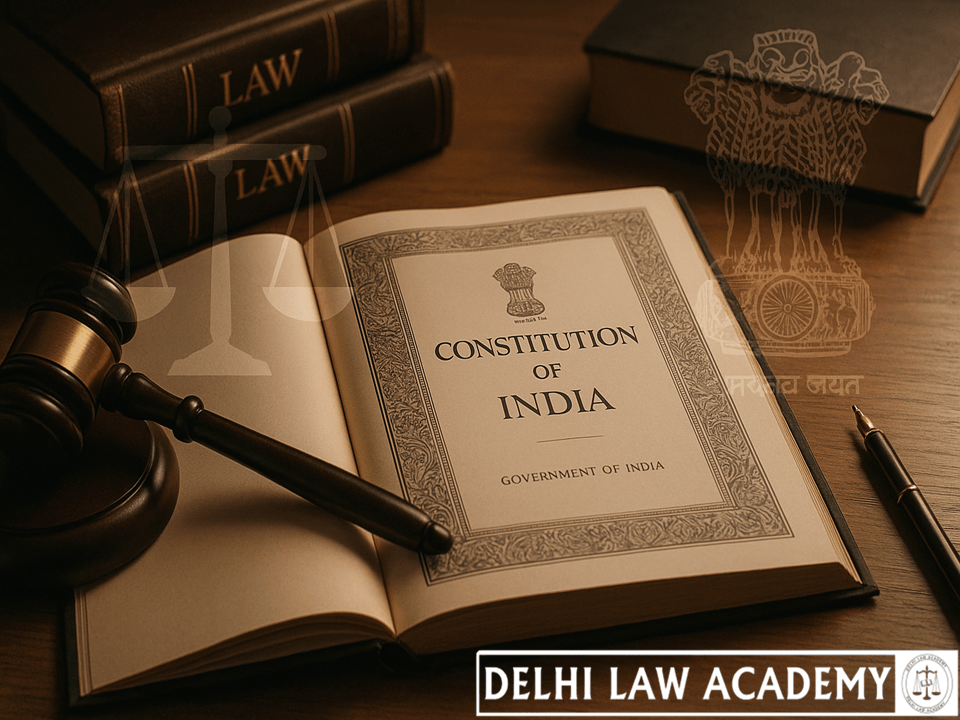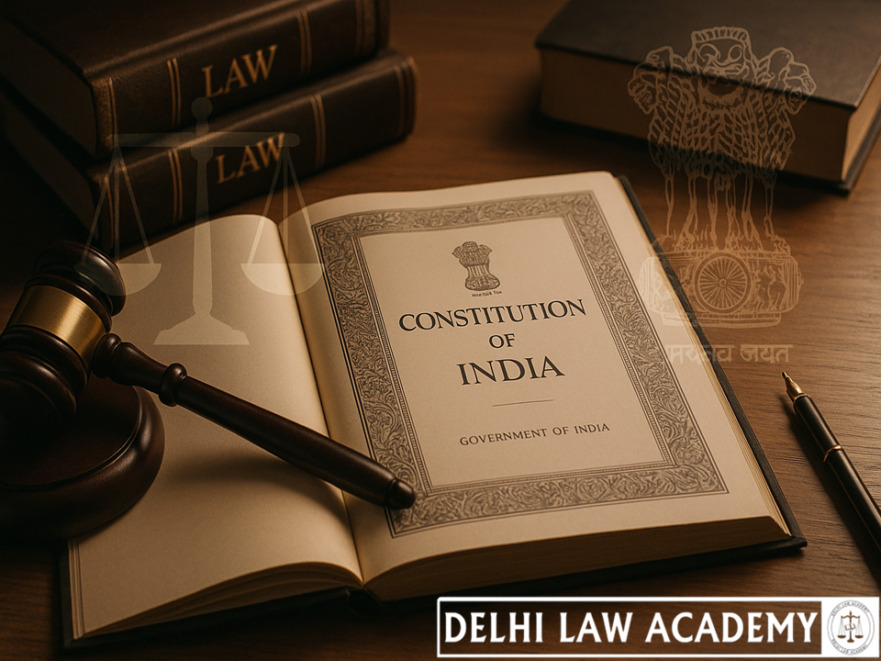
⚖️ Sohan Lal v. Union of India (1957 AIR 529) – Article 226
Delhi Law Academy Jaipur presents below for aspirants of RJS, DJS, PCS (J) and other Judicial Services throughout India a summarized version of the Supreme Court judgment in Sohan Lal v. Union of India answering the question whether a writ can be issued u/a 226 to a private entity/person and if yes, in what cases.
📘 Case Summary: Sohan Lal v. Union of India [1957 AIR 529]
Article 226
TOPIC:
• Scope of jurisdiction under article 226
Supreme Court:
• A writ of mandamus does not issue to or an order in the nature of mandamus is not made against a private individual.
• Such an order is made against a person directing him to do some particular thing, specified in the order, which appertains to his office and is in the nature of a public duty.
⚖️ Full Judgment (Text Preserved)
Appeal by special leave from the judgment and order dated April 30, 1953, of the Circuit Bench of the Punjab High Court at Delhi in Civil Writ Application No. 314 of 1952.
The respondent Jagan Nath filed a petition under Art. 226 of the Constitution in the Punjab High Court which was allowed. The High Court ordered the respondent the Union of India and the appellant Sohan Lal to forthwith restore possession of house No. 35 situated in West Patel Nagar, Delhi to Jagan Nath. Against this order of the High Court the appellant applied for and obtained special leave to appeal to this Court.
Jagan Nath is a displaced person and a refugee from Pakistan. The Government of India had devised various schemes for the rehabilitation of refugees. One of these was a scheme for sale of certain houses constructed by the Government of India for refugees in West Patel Nagar. It was not intended -under the scheme to entertain applications from displaced persons who had already been allotted agricultural land in East Punjab. A limited number of houses known as ‘box-type tenements” were constructed. According to -he procedure prescribed in order to give effect to the scheme, only those displaced persons, who were registered before the 15th of August, 1948, and were gainfully employed, were eligible for allotment of a house..
We do not propose to enquire into the merits of the rival claims of title to the property in dispute set up by the appellant and Jagan Nath. If we were to do so, we would be entering into a field of investigation which is more appropriate for a Civil Court in a properly constituted suit to do rather than for a Court exercising the prerogative of issuing writs. There are questions of fact and law which are in dispute requiring determination before the respective claims of the parties to this appeal can be decided. Before the property in dispute can be restored to Jagan Nath it will be necessary to declare that he had title in that property and was entitled to recover possession of it. This would in effect amount to passing a decree in his favour. In the circumstances to be mentioned hereafter, it is a matter for serious consideration whether in proceedings under Art. 226 of the Constitution such a declaration ought to be made and restoration of the property to Jagan Nath be ordered.
Jagan Nath had entered into a transaction with the Union of India upto a certain stage with respect to the property in dispute, but no letter of allotment had been issued him. Indeed, he had been informed, when certain facts became known, that the property in question could not be allotted to him as he was a displaced person who had been allotted land in East Punjab. As between Jagan Nath and the Union of India it will be necessary to decide what rights were acquired by the former in the property upto the stage when the latter informed Jagan Nath that the property would not be allotted to him.
Another question for decision will be whether Jagan Nath was allowed to enter into possession of the property because it was allotted to him or under a misapprehension as the Union of India was misled by the contents of his application. The case of the Union of India is that under the scheme Jagan Nath was not eligible for allotment of a house in West Patel Nagar, as it was subsequently discovered that he had been allotted, previous to his application, agricultural land in the District of Hissar. Being satisfied that Jagan Nath was not eligible for allotment, the Union of India refused to allot to him the tenement No. 35, West Patel Nagar and allotment of that house was made to the appellant who was found to be eligible in every way. The appellant was accordingly given possession of the property after Jagan Nath’s eviction. The appellant had complied with all the conditions imposed by the Union of India and a letter of allotment was actually issued to him and he entered into possession of the property in dispute under the authority of the Union of India.
Did the appellant thereby acquire a legal right to hold the property as against Jagan Nath? In our opinion, all these questions should be decided in a properly constituted suit in a Civil Court rather than in proceedings under Art. 226 of the Constitution.
The eviction of Jagan Nath was in contravention of the express provisions of s. 3 of the Public Premises (Eviction) Act. His eviction, therefore, was illegal. He was entitled to be evicted in due course of law and a writ of mandamus could issue to or an order in the nature of mandamus could be made against the Union of India to restore possession of the property to Jagan Nath from which he had been evicted the property was still in the possession of the Union of India. The property in dispute, however, is in possession of the appellant. There is no evidence and no finding of the High Court that the appellant was in collusion with the Union of India or that he had knowledge that the eviction of Jagan Nath was illegal.
Normally, a writ of mandamus does not issue to or an order in the nature of mandamus is not made against a private individual. Such an order is made against a person directing him to do some particular thing, specified in the order, which appertains to his office and is in the nature of a public duty (Halsbury’s Laws of England Vol. 11, Lord Simonds Edition, p. 84).
If it had been proved that the Union of -India and the appellant had colluded, and the transaction between them was merely colourable, entered into with a view to deprive Jagan Nath of his rights, jurisdiction to issue a writ to or make an order in the nature of mandamus against the appellant might be said to exist in a Court.
In our opinion, the High Court erred in allowing the application of Jagan Nath filed under Art. 226 of the Constitution and making the order it did. The appeal is accordingly allowed and the order of the High Court is set aside.
**************
📘 Stay Ahead with Delhi Law Academy!
Get access to free monthly current affairs, read our insightful blogs,
and explore free study resources prepared by experts at DLA Jaipur. 🚀
❓ FAQs on Sohan Lal v. Union of India & Writs Under Article 226
⚖️ Can a writ of mandamus be issued against a private individual?
No. The Supreme Court in Sohan Lal (1957) held that mandamus does not lie against purely private persons.
A writ can be issued only if the individual is performing a public duty or is acting in collusion with a government authority.
🏛️ What is the scope of Article 226 in property or title disputes?
Article 226 is generally not meant for adjudicating property disputes, title conflicts, or landlord–tenant matters.
These require evidence and factual findings suited for a civil court, not a writ court.
The Supreme Court reiterated this in Sohan Lal and several later decisions.
🤝 When can a writ be issued against a private party under Article 226?
A writ may lie against a private individual only if:
• They perform a statutory or public duty, or
• They act in collusion with the State to deprive someone of their rights.
Without these elements, writ jurisdiction does not apply to private disputes.
📜 Why did the Supreme Court reject the High Court’s order in Sohan Lal?
Because the dispute involved competing title claims between two private individuals, requiring detailed fact-finding.
Such matters are inappropriate for writ jurisdiction.
The Supreme Court held that the High Court erred in ordering restoration of possession under Article 226.
🔍 In what situations does mandamus apply under Article 226?
Mandamus is issued to compel:
• Government bodies
• Statutory authorities
• Public officials
to perform duties mandated by law.
It does not enforce private rights against private individuals unless a public duty is involved.
⚠️ What is the significance of the “collusion” test in this judgment?
The Court clarified that if a private person acts in collusion with the government to deprive someone of rights, a writ may lie against them.
But in Sohan Lal, no collusion between the appellant and the Union of India was proven—hence mandamus could not be issued against the private appellant.
Contact us
📍 Delhi Law Academy – Jaipur Branch
6C, Tower 2, Coaching Hub, Pratap Nagar, Jaipur – 302033
📞 Phone:
+91 9911916552
+91 8447285606
✉️ Email:
contactus@delhilawacademy.com

